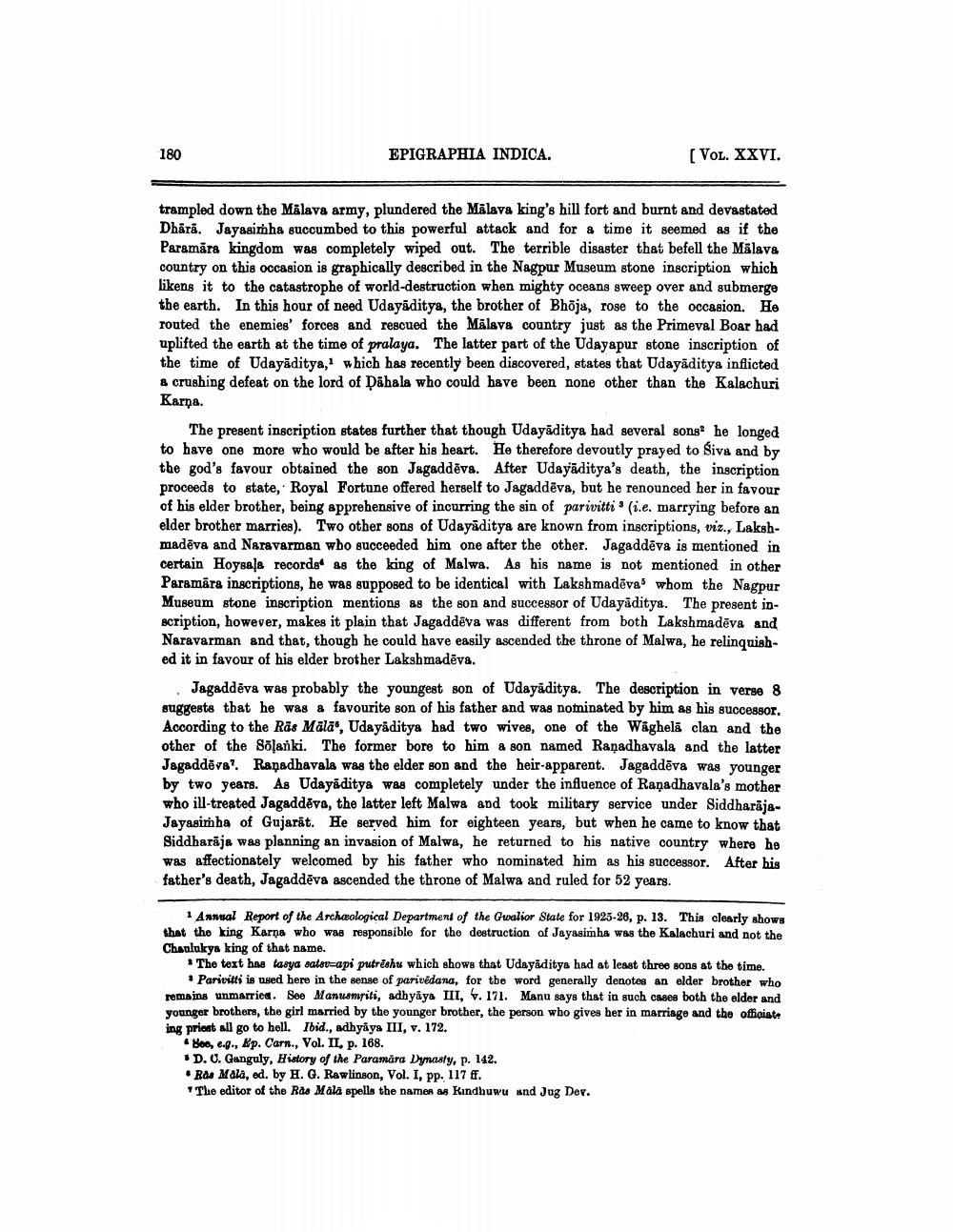________________
180
EPIGRAPHIA INDICA.
(VOL. XXVI.
trampled down the Mälava army, plundered the Mālava king's hill fort and burnt and devastated Dhärā. Jayasimha succumbed to this powerful attack and for & time it seemed as if the Paramāra kingdom was completely wiped out. The terrible disaster that befell the Mälava country on this occasion is graphically described in the Nagpur Museum stone inscription which likens it to the catastrophe of world-destruction when mighty oceans sweep over and submerge the earth. In this hour of need Udayāditya, the brother of Bhöja, rose to the occasion. He routed the enemies' forces and rescued the Mālava country just as the Primeval Boar had uplifted the earth at the time of pralaya. The latter part of the Udayapur stone inscription of the time of Udayāditya,' which has recently been discovered, states that Udayāditya inflicted & crushing defeat on the lord of Dāhala who could have been none other than the Kalachuri Karna.
The present inscription states further that though Udayāditya had several song he longed to have one more who would be after his heart. He therefore devoutly prayed to Siva and by the god's favour obtained the son Jagaddēva. After Udayāditya's death, the inscription proceeds to state, Royal Fortune offered herself to Jagaddēva, but he renounced her in favour of his elder brother, being apprehensive of incurring the sin of parivitti (i.e. marrying before an elder brother marries). Two other sons of Udayāditya are known from inscriptions, viz., Lakshmadēva and Naravarman who succeeded him one after the other. Jagaddēva is mentioned in certain Hoysala recordat as the king of Malwa. As his name is not mentioned in other Paramāra inscriptions, he was supposed to be identical with Lakshmadēvas whom the Nagpur Museum stone inscription mentions as the son and successor of Udayaditya. The present inscription, however, makes it plain that Jagaddēva was different from both Lakshmadēva and Naravarman and that, though he could have easily ascended the throne of Malwa, he relinquished it in favour of his elder brother Lakshmadēva.
· Jagaddēva was probably the youngest son of Udayāditya. The description in verse 8 suggests that he was a favourite son of his father and was nominated by him as his successor, According to the Ras Mala, Udayaditya had two wives, one of the Wäghelā clan and the other of the Solanki. The former bore to him a son named Raņadhavala and the latter Jagaddēval. Ranadhavala was the elder son and the heir-apparent. Jagaddēva was younger by two years. As Udayāditya was completely under the influence of Raņadhavala's mother who ill-treated Jagaddēva, the latter left Malwa and took military service under Siddharāja. Javasimha of Gujarat. He served him for eighteen years, but when he came to know that Siddharăja was planning an invasion of Malwa, he returned to his native country where he was affectionately welcomed by his father who nominated him as his successor. After his father's death, Jagaddēva ascended the throne of Malwa and ruled for 52 years.
1 Annual Report of the Archaological Department of the Gwalior State for 1925-20, p. 13. This clearly shows that the king Karna who was responsible for the destruction of Jayasimha was the Kalachuri and not the Chanlukya king of that name.
* The text hae tasya salav=api putrahu which shows that Udayaditya had at least three sons at the time.
• Parivitti is used here in the sense of parivedana, for the word generally denotes an elder brother who remains unmarried. See Manusmriti, adhyaya III, v. 171. Manu says that in such cases both the elder and younger brothers, the girl married by the younger brother, the person who gives her in marriage and the officiat. ing priest all go to hell. Ibid., adhyāya III, v. 172.
Neo, e.g., Kp. Carn., Vol. II, p. 168. •D. U. Ganguly, History of the Paramara Dynasty, p. 142. Ras Mala, ed. by H. G. Rawlinson, Vol. I, pp. 117 ff. The editor of the Ras Mala spells the names a Kindhuwu und Jug Dev.




